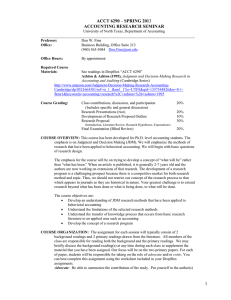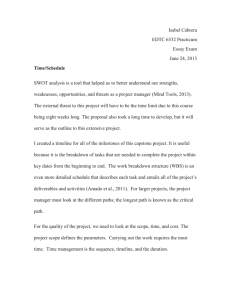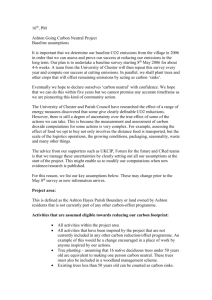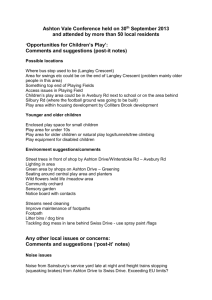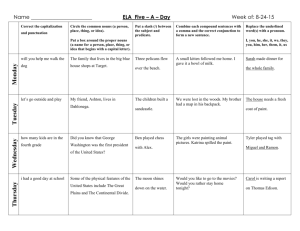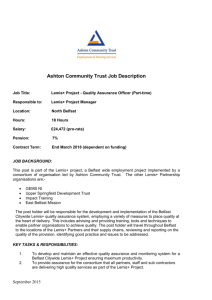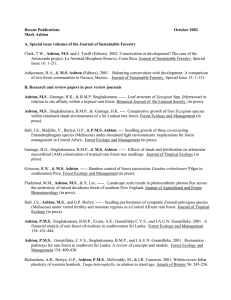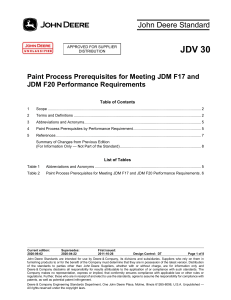ACCT 6290 ACCOUNTING RESEARCH SEMINAR _______________________________________________________________________
advertisement
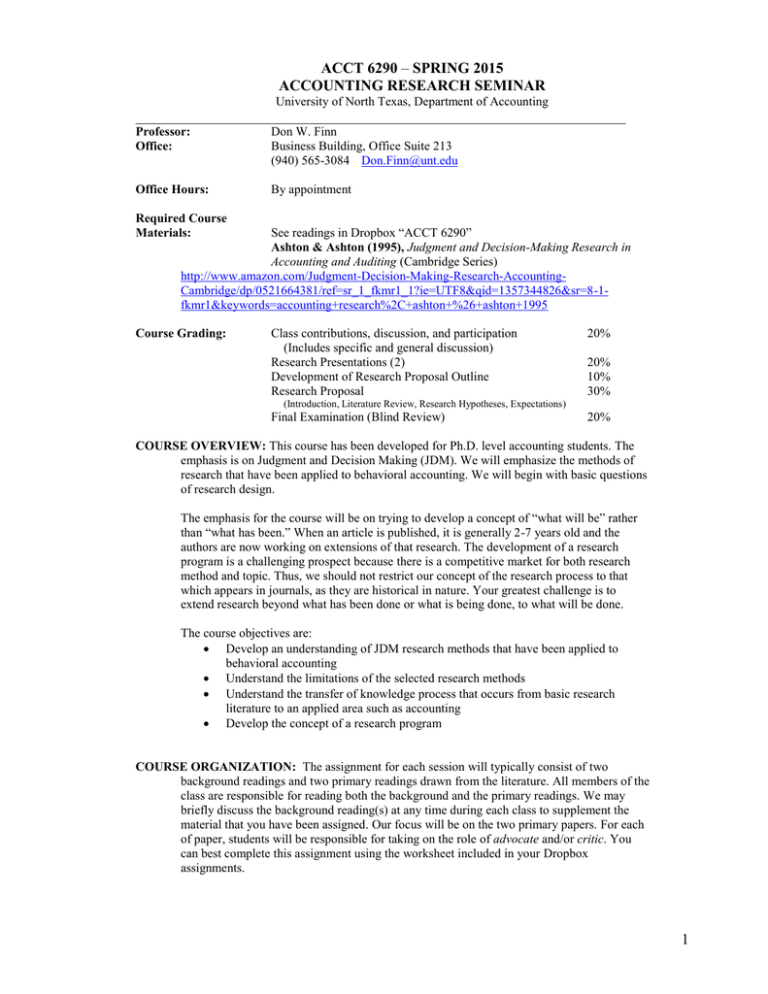
ACCT 6290 – SPRING 2015 ACCOUNTING RESEARCH SEMINAR University of North Texas, Department of Accounting _______________________________________________________________________ Professor: Office: Don W. Finn Business Building, Office Suite 213 (940) 565-3084 Don.Finn@unt.edu Office Hours: By appointment Required Course Materials: See readings in Dropbox “ACCT 6290” Ashton & Ashton (1995), Judgment and Decision-Making Research in Accounting and Auditing (Cambridge Series) http://www.amazon.com/Judgment-Decision-Making-Research-AccountingCambridge/dp/0521664381/ref=sr_1_fkmr1_1?ie=UTF8&qid=1357344826&sr=8-1fkmr1&keywords=accounting+research%2C+ashton+%26+ashton+1995 Course Grading: Class contributions, discussion, and participation (Includes specific and general discussion) Research Presentations (2) Development of Research Proposal Outline Research Proposal 20% 20% 10% 30% (Introduction, Literature Review, Research Hypotheses, Expectations) Final Examination (Blind Review) 20% COURSE OVERVIEW: This course has been developed for Ph.D. level accounting students. The emphasis is on Judgment and Decision Making (JDM). We will emphasize the methods of research that have been applied to behavioral accounting. We will begin with basic questions of research design. The emphasis for the course will be on trying to develop a concept of “what will be” rather than “what has been.” When an article is published, it is generally 2-7 years old and the authors are now working on extensions of that research. The development of a research program is a challenging prospect because there is a competitive market for both research method and topic. Thus, we should not restrict our concept of the research process to that which appears in journals, as they are historical in nature. Your greatest challenge is to extend research beyond what has been done or what is being done, to what will be done. The course objectives are: Develop an understanding of JDM research methods that have been applied to behavioral accounting Understand the limitations of the selected research methods Understand the transfer of knowledge process that occurs from basic research literature to an applied area such as accounting Develop the concept of a research program COURSE ORGANIZATION: The assignment for each session will typically consist of two background readings and two primary readings drawn from the literature. All members of the class are responsible for reading both the background and the primary readings. We may briefly discuss the background reading(s) at any time during each class to supplement the material that you have been assigned. Our focus will be on the two primary papers. For each of paper, students will be responsible for taking on the role of advocate and/or critic. You can best complete this assignment using the worksheet included in your Dropbox assignments. 1 Advocate: Be able to summarize the contribution of the study. Put yourself in the author(s) shoes, and accentuate the positive aspects of what we can learn from this research. You may safely assume that we have read the article, so there is no need to present a dry summary. Rather articulate your perspective on the motivation of the paper (i.e. why the topic is important) and the insights that were provided by the study. Critic: Your task is to critically evaluate the study. Consider the strength of the motivation, design, analysis, and presentation. If you observe flaws, consider the weight of these flaws relative to the benefits of the research contribution and suggest possible ways that the researcher might have avoided any problems you encountered. Always endeavor to be constructive in this class and in your future experience as a reviewer. Emphasize questions left unanswered by the study and suggest how future research might approach such questions. What you must hand in: For each class, you should provide typed comments for your assignment using the “Paper Summaries” spreadsheet. Working paper review and future ideas: Most of the papers we will read in class have been published in top-tier accounting journals. Although these papers are not without flaws, they have been through a rigorous review process, which provides at least some assurance of their quality. To give you some exposure to the difficulty of evaluating papers which have not yet been (or may not be) published, you will also be required to do a "blind" review of a current working paper (which I will provide). If possible, I will also provide feedback from "real" reviewers so that you get a sense for whether your comments are on target. You should also keep a list of potential research ideas that are generated by the articles that we cover in this class that relate to your specific interest area (e.g., systems, managerial, tax, auditing, etc.). Strive to come up with at least one idea for each of our class sessions. I will collect your list of ideas at the end of the semester. For your future research idea, you should write 1-2 pages that flesh out your research idea in more detail. This should read like the introduction section of a research paper, which typically contains a description of the basic research question, why the question is important (i.e. motivation) and the general research methodology that would be used to test the question. You should distribute copies (a few days in advance) to everyone in class and come prepared to spend 5 minutes telling us about your idea. The entire class will be responsible for providing suggestions about the basic research idea, and I will attempt to provide feedback about the quality of your writing. You should submit your research ideas by the due dates indicated in your schedule of class meetings. CLASSROOM CONTRIBUTIONS: This is an interactive class. Much of your learning will occur during class discussions and exercises. Points will be awarded for contributions to the class. Classroom contributions account for 20% of the course points. Class participation points are NOT rewarded exclusively for “good” answers to questions. Contributions to the class also include asking thoughtful questions, helping to focus complicated ideas, suggesting reasonable alternatives, and being willing to try out new ideas. MAKE-UP POLICY: It is to your advantage to submit all due materials at their scheduled times. Only in the case of a well-documented legitimate emergency should an assignment be missed. Assignments missed without prior approval or without adequate documentation of the reason for missing the assignment will result in a recorded grade of zero for the missed assignment. ATTENDANCE POLICY: Because this is an interactive class, learning depends on attendance. Lack of attendance is a direct component of your class grade, participation points cannot be accumulated if you are not in class. 2 INCRLEMENT WEATHER POLICY: Please use your own good judgment during inclement weather. My plan is to hold class whenever the University is open. If you are in doubt, you may call me and if there is no answer, please contact the Department Administrative Assistant Suzanna Hicks at 575-4051. ACADEMIC INTEGRITY: Ethics and values are very important in accounting and the professional environment in which you will be working and are equally important in education. I will assume, unless there is evidence to the contrary, that you are an ethical student. To help you fulfill your ethical responsibilities as a student, please refer to the University policy for information on academic integrity standards of the University of North Texas. If there is an academic integrity violation, university recommended sanctions for academic integrity violations will be imposed. The university academic integrity policy can be found at http://vpaa.unt.edu/academic-integrity.htm. PENALTY FOR ACADEMIC INTEGRITY VIOLATIONS: University-recommended sanctions for academic integrity violations will be imposed. All academic integrity violations will be reported to Judicial Affairs. CHANGES TO THE SYLLABUS: A syllabus is a tool to help you plan your time. Every effort is made to make the syllabus as complete as possible, but there may be occasions when changes are required. Your professor will announce any deviations from this syllabus through email and class announcements. STUDENT BEHAVIOR IN THE CLASSROOM: Student behavior that interferes with an instructor’s ability to conduct a class or other students' opportunity to learn is unacceptable and disruptive. This type of behavior will not be tolerated in any instructional forum at UNT. Students engaging in unacceptable behavior will be directed to leave the classroom and the instructor may refer the student to the Center for Student Rights and Responsibilities to consider whether the student's conduct violated the Code of Student Conduct. The university's expectations for student conduct apply to all instructional forums, including university and electronic classroom, labs, discussion groups, field trips, etc. The Code of Student Conduct can be found at www.unt.edu/csrr. ACCOMMODATIONS FOR STUDENTS WITH DISABILITIES: Please note the guidelines for the arrangement of testing accommodations for students with disabilities. Students are responsible for requesting accommodations from the Office of Disability Accommodation, according to its procedures and policies. To verify the eligibility of the student, students are expected to show appropriate documentation to the instructor when they first request accommodation. Students are to provide a written request for each test accommodation to their instructor (an e-mail will suffice provided you have received a reply from the instructor). CLASS EVALUATION (SETE): The Student Evaluation of Teaching Effectiveness (SETE) is a requirement for all organized classes at UNT. 3 ACCT 6290 – SPRING 2015 SCHEDULE OF CLASS MEETINGS1 Class 1 Date 1/20 2 1/27 3 2/3 Topics Introduction and Judgment & Decision Making (JDM) Epistemology and Research Methods (Discussion of Research Proposal) 4 5 Judgment & Decision Making (JDM) 2/10 2/17 6 2/24 7 3/3 8 3/10 JDM JDM/ Framing Decisions JDM/Framing Decisions Research Presentation (#1) JDM/Decision Making Readings Argyris, 1952 Libby et al, 2002 Alston, 1976 Annis, 1978 McMillan & White, 1993 McCaffrey & Baron, 2003 Secondary Readings For Class Maiga & Jacobs, 2005 Jensen, 1993 Batson & Shaw, 1991 Mook, 1991 Ashton & Ashton, 1995 (Ch. 1) Bonner, 1999 Kinney, 1986 Tversky & Kahneman, 1986 Kahneman et. al., 1997 Ashton & Ashton, 1995 (Ch. 5) Kahneman, 2003 Chang, et al, 2002 Haynes & Kachelmeier, 1998 Brown & Solomon, 1987 Ashton & Ashton, 1995 (Ch. 6) Power, 2012 Brazel et al, 2012 Ashton & Ashton, 1995 (Ch. 6) Luft, 2009 Riley, et al., 2003 Francis et al, 2003 Schefczyk, 1993 Church et al, 2012 Fullerton et al 2013 Anderson et al, 2003 Cannon, 2014 Borkowski et al, 2001 Perspectives on JDM research in accounting auditing The individual versus the aggregate Ashton & Ashton, 1995 (Ch. 7) The role of knowledge and memory in audit judgment JDM research in auditing Ashton & Ashton, 1995 (Ch. 8) Research in and development of auditdecision aids 9 3/16 3/17 3/24 10 3/31 11 4/7 Fraud Risk and Non-Financial Performance Measures Research Proposal Outline Due Spring Break (3/16 – 3/20) Fraud Risk and Non-Financial Performance Measures Non-Financial Performance Measures Budgeting & Control 12 4/14 Managerial Cost Behavior 13 4/21 Research Proposal Presentations (#2) In Class Presentations (30 minute limit) 14 4/28 Managerial Accounting & Organizational Incentive Systems Sprinkle, 2003 Merchant, et al, 2003 15 5/5 Research Proposal Due Final Examination JDM research in auditing Choo & Curtis, 2000 Structural Assessment Kwok & Sharp, 1998 Construct Measurement Covaleski, et al, 2003 Criteria for Selective Integration Ashton & Ashton, 1995 (Ch. 3) Experimental incentive-contracting research in management accounting Blind review of research paper Legend: Primary Behavioral Research Focus Methodology/Research Design JDM Issues Budgeting Issues, Managerial Articulation (Economics/Psychology/Sociology) JDM Epistemology Nonfinancial versus financial measures 1 In addition to the syllabus material that have been developed, thanks to the following individuals for sharing their syllabi materials (that have liberally been used in this course) which enhance the depth and breadth of the course – Lisa Koonce, Vicky Hoffman and Don Moser (who adapted materials from Bob Libby), Urton Andersen, Bud Fennema, Don Clancy, Stacey Whitecotten, Marlys Lipe, and Joan Luft. Page 1
